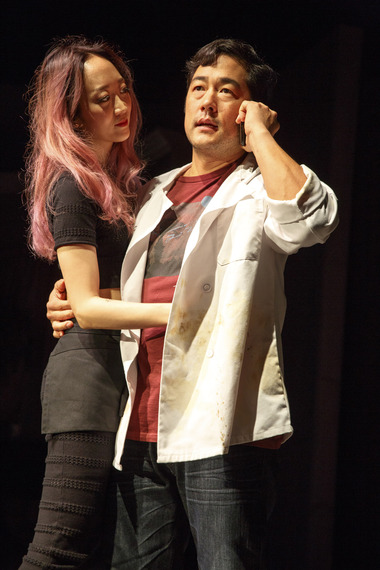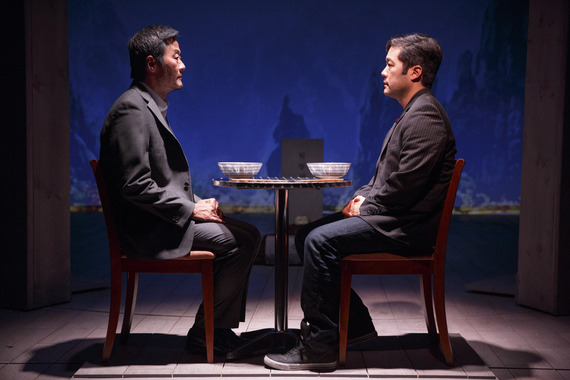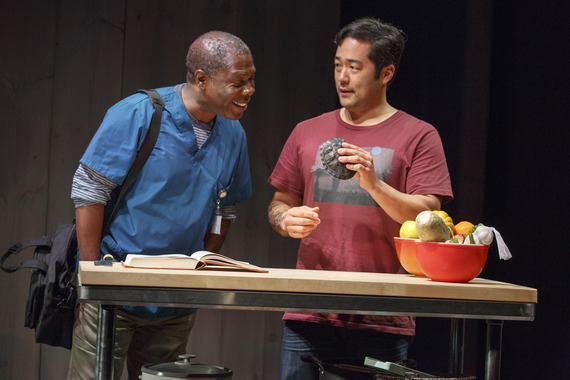A well-heeled former yuppie (Jessica Love) steps downstage, at the start of Playwrights Horizons' Aubergine, with an extended monologue about family, illness and pastrami. Halfway through the speech, playwright Julia Cho has already grabbed us. Though she suddenly switches to what appears to be an altogether different type of play, about a Korean-American chef and his father, Cho keeps us thoroughly engaged. Aubergine is a provocative, emotionally-effective comedy-drama centered around death, family and gastronomy, and totally delectable.
The action starts--as in so many other plays nowadays--in a hospital room. Ray (Tim Kang) is an expert chef; he watches as his father (Stephen Park) suffers, unwilling to accept that the man is dying of cirrhosis. Ray not-so-willingly agrees to take his father home, setting up hospice care in the dining room. (The play takes place in the suburbs of a large American city.) Lucien (Michael Potts) is a caring nurse, a refugee with a lilting Caribbean accent. He guides Ray as they prepare Father for death.
Cornelia (Sue Jean Kim), a waitress at Ray's restaurant, enters awkwardly. Ray had abruptly and unexplainedly stopped seeing her. Now he wants--or rather needs--her to call his father's brother, back in Korea; Uncle (Joseph Steven Yang) doesn't speak English, and Ray doesn't speak Korean. When the uncle arrives, Cornelia serves as translator. In the process, we learn about the characters--the play is punctuated by monologues by each of them--and ultimately they break through their several walls to understand each other. This Cho does in a most satisfying manner, winding up her story with a heartfelt tug followed by a crowd-pleasing coda which winningly ties up loose ends.
In the world of Cho's play, everyone seems to have father problems; Ray's father, for one, responds to his son's ranking as a world-class chef by refusing to eat his cooking while pointedly opting for "ten-cents-a-pack" instant ramen. Ray and Cornelia both carry parental resentment--wrapped up in food--although they come to realize that what they saw as criticism might well have been old-country sacrifice. Food is a major theme of the play; "aubergine" is another name for eggplant. ("Call them aubergines," explains Lucien, "then they taste better.") Part of the discussion also centers on turtle soup, although we can attest that no turtles are harmed in the performance of the play.
The cast is universally strong. Mr. Kang seems to be a newcomer; he only lists one regional credit aside from the original Berkeley Rep production of Aubergine. His Ray is properly complex; like "a little kid who takes out all the toys and then changes his mind and doesn't clean up and goes," as Cornelia complains. Ms. Kim gives a refreshing performance as the more worldly Korean-American--her hair tinged in pink--who helps Ray break through the walls as he faces his father's death.
Yang, the other cast holdover from this spring's production at Berkeley, is also very good, offering a fully-rounded performance delivered solely in Korean. (His parting scene, as he returns to Korea, is likely to bring a sob.) Park plays most of the show lying comatose onstage, while Ms. Love scores well in her three scenes, including that opening monologue. Michael Potts, with a lilting accent which obscures the fact that this is the same actor who convulsed audiences with "Hasa Diga Eebowai" in The Book of Mormon, provides a calming influence as he prepares the parent (and the son) for death.
This very special play is well guided by director Kate Whoriskey (who staged Cho's The Piano Teacher and Lynn Nottage's Intimate Apparel and Ruined). Derek McLane (of I Am My Own Wife and Beautiful) gives us another intimate but handsomely functional set, with curved walls which close downstage to alter the playing space. Playwright Cho has more than a dozen productions to her credit, including one apiece at the Public, the Roundabout, Vineyard and now Playwrights. The impressive Aubergine demonstrates that she is a first class playwright, indeed.
.
Julia Cho's Aubergine opened September 12, 2016 and continues through October 2 at Playwrights Horizons



